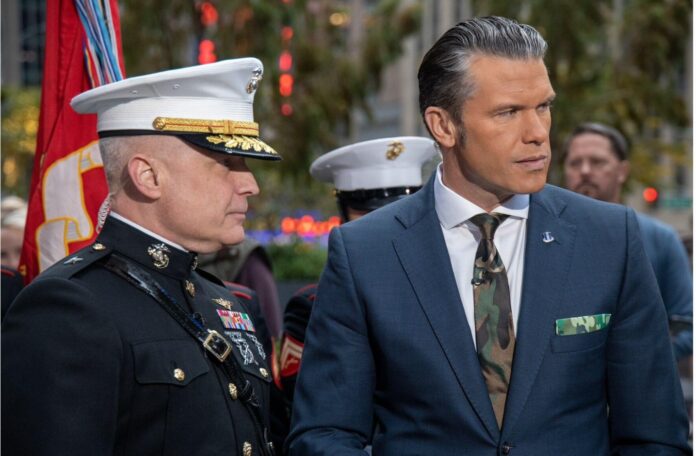
By TIM MURTAUGH
Rush Limbaugh used to call them the “drive-by media.”
That’s how the legendary talk show host used to describe journalists who blast out reckless stories like criminals spraying gunfire from moving vehicles.
“Their actions sometimes are destructive and ruinous to individuals,” Limbaugh told a caller named Brad from Topeka, Kansas, in 2007, when asked why he used the phrase. “They kill the reputations of people, or try to. And then they get in the convertible, head on down the highway, and find the next group of people to do the same thing while there are those of us who have to go in and clean up the mess.”
Well, the drive-by media are at it again, because that’s exactly what the leftist publication ProPublica tried to do to Pete Hegseth, President-elect Donald Trump’s designee for secretary of defense.
At 12:52 p.m. on Dec. 10, a ProPublica reporter emailed Mr. Hegseth’s team asking why the nominee had “made false statements” about being accepted to West Point, the U.S. Military Academy. The liberal outlet had decided to fact-check that aspect of Mr. Hegseth’s biography, and the school had twice told him that not only was he not accepted to the institution, but he had never even applied.
“Why did Mr. Hegseth say he got in to West Point when that is not true?” ProPublica asked, and set a one-hour deadline for a response.
Had the story had been published and had been accurate, that the nominee to lead the Department of Defense had lied about getting into West Point, then it would have immediately killed any chance he had of being confirmed by the Senate.
But it wasn’t true, and Mr. Hegseth could prove it. He rapidly produced his acceptance letter from January 1999.
The West Point public affairs office admitted having made an error, and the ProPublica story got shut down in its tracks. Little did Mr. Hegseth know, when he kept that document as a memento, that it would play such an important role 25 years later.
When the email traffic from ProPublica was released, the one-hour deadline and accusatory tone of the messages made it clear that the publication had already reached its conclusion before it contacted the target of its hit piece. Rather than inviting Mr. Hegseth to explain the discrepancy between his claims about West Point admission and the school’s initial denial, ProPublica chose to outright accuse him of lying about it, and you could practically feel the glee seeping from the text of the email.
When an uproar arose about ProPublica’s tactics, mostly in conservative media, the outlet’s editor took to the social media platform X to offer a defense.
“So: No, we are not publishing a story,” Jesse Eisinger wrote. “This is how journalism is supposed to work. Hear something. Check something. Repeat steps 1 and 2 as many times as needed. The end.”
Except that’s not how journalism is supposed to work.
Fair journalists don’t load up hit pieces against unaware subjects and allow their intended target only one hour to gather and supply a response.
But then again, fair journalists might recognize that the real story was that someone at West Point misled the media about the military record of the nominee for secretary of defense. It seems likely that ProPublica would find it newsworthy if other government agencies made glaring misstatements to the media. Still, it elected to drop the whole thing in this instance.
Again, it’s worth noting that if Mr. Hegseth had not kept a letter he received a quarter century ago, this story likely would have gone the other way. The barrage that ProPublica would have unleashed would have been deafening, and the drive-by media would have struck again.
But Mr. Hegseth survived, and his nomination now appears to be on steady ground.
We’ve just come through an election where the corporate media spent all its time lionizing one candidate while demonizing the other. Vice President Kamala Harris, the Democrat, was the media darling, while Mr. Trump, the Republican, was the devil incarnate.
According to a Media Research Center analysis of the broadcast networks — ABC, CBS and NBC — Ms. Harris received 78% positive coverage versus 22% negative coverage during the campaign. Regarding Mr. Trump, those numbers flipped — 85% negative stories versus only 15% positive.
The center called the network reporting “the most wildly imbalanced in history” and “the worst ever.”
And if the Pete Hegseth-ProPublica fiasco is any indication, the media collectively haven’t improved much since the election.
Tim Murtaugh is a Washington Times columnist and the founder and principal of Line Drive Public Affairs LLC. He served as a senior adviser to the 2024 Trump campaign and as communications director of the 2020 Trump campaign. This column first ran in the Washington Times.